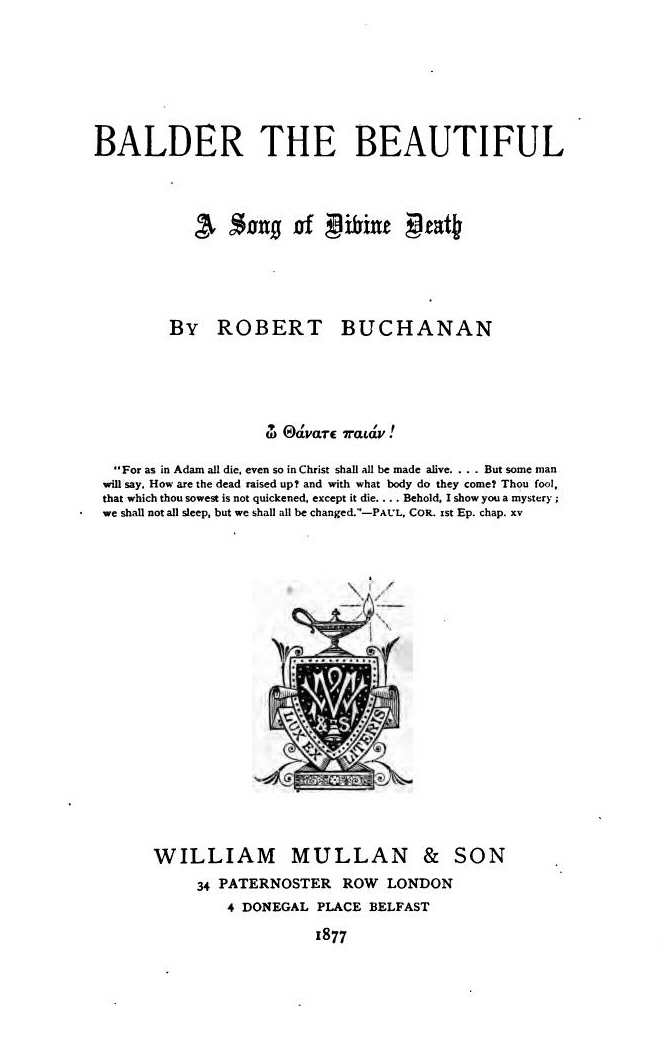ROBERT WILLIAMS BUCHANAN (1841 - 1901)
|
ROBERT WILLIAMS BUCHANAN (1841 - 1901) |
|
|
|
|
|
|
|
|
BALDER THE BEAUTIFUL
i
BALDER THE BEAUTIFUL.
iii |
 |
|
BALDER THE BEAUTIFUL
A Song of Divine Death
BY ROBERT BUCHANAN |
|
“For as in Adam all die, even so in Christ shall all be made alive. . . . But some man
WILLIAM MULLAN & SON 34 PATERNOSTER ROW LONDON 1877
iv
NOTE. It may be well for readers of the following poem to dismiss from their minds all recollection of the “Eddas,” Ewald’s “Balder,” Oehlenschläger’s “Balder hün Gode,” and even Mr. Arnold’s “Balder Dead.” With the hero of these familiar works, my Balder has little in common; he is neither the shadowy god of the “Edda,” nor the colossal hero of Ewald, nor the good principle of Oehlenschläger, nor the Homeric demigod of Mr. Arnold. In the presentation of both the Father and Son, I have reverted to the lines of the most primitve mythology: discovering in the one the northern Messiah as well as the northern Apollo, in the other (instead of the degraded Odin of later superstition) the Alfadur, or temporarily omnipotent godhead, who, despite his darker features, has affinity with both the Zeus of the Eleusinian mysteries and the Jehovah of the Bible. It is unnecessary, however, further to explain the spirit of a poem which each competent reader will interpret in his own way, and which, if it fulfils its purpose at all, should have many meanings for many minds.
____________________ Printed by Hazell, Watson, and Viney, London and Aylesbury.
v PAGE PROEM TO —— : A SONG OF A DREAM ix
BALDER THE BEAUTIFUL: A SONG OF DIVINE DEATH.
|
|
[Notes: |
 |
|
And on page 64 of The Mourning Voice by Nicole Loraux (Cornell University Press, 2002), there is the following passage: Buchanan writes in his Introductory Note, ‘A portion of “Balder the Beautiful” has already been printed in the pages of the Contemporary Review.’ A large selection from the poem appeared in the editions of March, April and May, 1877. The relevant volume of the Contemporary Review (No. 29) is available at the Internet Archive. The extract in the March edition begins with the Greek quotation, followed by the ‘The gods are brethren’ verse from page xvi, then Book IV (now I) ‘Balder’s Return To Earth’. This is followed by Book V (now II) ‘Balder’s Quest For Death’, Part IV of which is renamed, ‘The Face In Heaven’ and ends after the first verse. Buchanan’s Introductory Note is also included, with this second paragraph: “In publishing the poem in the CONTEMPORARY REVIEW, at the request of the Editor, the author has thought it advisable to omit the earlier portions, descriptive of Balder’s birth and gradual growth into the life of Naturte, his first journey heavenward, and his sad dissatisfaction with the cruel, pitiless life of gods. All that the reader requires to bear in mind, for the perfect understanding of what follows, is that Balder, as here pictured, is the divine spirit of earthly beauty and joy, and the only one of the gods who loves and pities men. Sick of the darkness of heaven, he returns to the Earth which fostered him, and of which he is beloved, and now for the first time he becomes conscious of that Shadow of Death which darkens the lot of all mortal things.—R. B.” The extract in the April edition begins with Book VI (now III) ‘Balder And Death’, but includes the missing part of Book V, Part IV, following on from the first verse. The subsequent parts of Book VI are renumbered, but retain their titles. Book VII (now IV) ‘The Coming Of The Other’ follows, the first part of which is titled ‘Snowdrift’. The first part of Book VIII is added as Part IX of Book VII. The extract in the May edition continues with Book VIII (now V) ‘The Twilight Of The Gods’, starting with the second part, and concludes with Book IX (now VI) ‘The Last Blessing’.] Reviews of Balder The Beautiful Back to Poetry
|
|
|
|
|
|
|